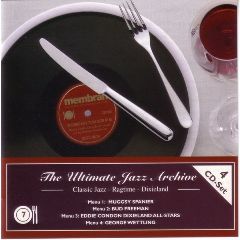The Ultimate Jazz Archive CD26 – Bud Freeman [1939-1940] [2005]
The Ultimate Jazz Archive Vol.26 – Bud Freeman [1939-1940] [2005]

01.Sensation 02.Fidgety Feet 03.Tia Juana 04.Copenhagen 05.I’ve Found A New Baby 06.Easy To Get 07.China Boy 08.The Eel 09.Oh! Baby 10.I Need Some Pettin’ 11.Susie 12.Big Boy 13.As Long As I Live 14.The Sail Fish 15.Sunday 16.Satanic Blues 17.Jack Hits The Road 18.Forty Seven And State 19.Muskrat Ramble 20.That Da-Da Strain 21.Shim-Me-Sha-Wabble 22.At The Jazz Band Ball 23.Prince Of Wails 24.After Awhile 25.Love Is Just Around The Corner
When Bud Freeman first matured, his was the only strong alternative approach on the tenor to the harder-toned style of Coleman Hawkins and he was an inspiration for Lester Young. Freeman, one of the top tenors of the 1930s, was also one of the few saxophonists (along with the slightly later Eddie Miller) to be accepted in the Dixieland world, and his oddly angular but consistently swinging solos were an asset to a countless number of hot sessions.
Freeman, excited (as were the other members of the Austin High School Gang in Chicago) by the music of the New Orleans Rhythm Kings, took up the C-melody sax in 1923, switching to tenor two years later. It took him time to develop his playing, which was still pretty primitive in 1927 when he made his recording debut with the McKenzie-Condon Chicagoans. Freeman moved to New York later that year and worked with Red Nichols' Five Pennies, Roger Wolfe Kahn, Ben Pollack, Joe Venuti, Gene Kardos, and others. He starred on Eddie Condon's memorable 1933 recording "The Eel." After stints with Joe Haymes and Ray Noble, Freeman was a star with Tommy Dorsey's Orchestra and Clambake Seven (1936-1938) before having a short unhappy stint with Benny Goodman (1938). He led his short-lived but legendary Summe Cum Laude Orchestra (1939-1940) which was actually an octet, spent two years in the military, and then from 1945 on, alternated between being a bandleader and working with Eddie Condon's freewheeling Chicago jazz groups. Freeman traveled the world, made scores of fine recordings, and stuck to the same basic style that he had developed by the mid-'30s (untouched by a brief period spent studying with Lennie Tristano). Bud Freeman was with the World's Greatest Jazz Band (1968-1971), lived in London in the late '70s, and ended up back where he started, in Chicago. He was active into his eighties, and a strong sampling of his recordings are currently available on CD. --- Scott Yanow, Rovi
download (mp3 @160 kbs):
uploaded yandex 4shared gett mediafire mega solidfiles zalivalka cloudmailru filecloudio anonfiles oboom
Zmieniony (Czwartek, 11 Wrzesień 2014 16:10)








